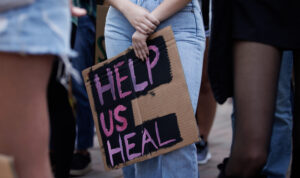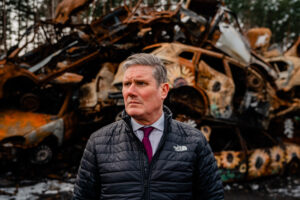By the time my husband and I had our second child five years ago, I had long been researching “parent-bashing”. I knew that while parenting matters, it doesn’t matter nearly as much as the hoards of “parenting experts” would have us believe. Still, I couldn’t help but wonder: will my children blame me for their future hardships? Because I was too harsh or too kind? Too involved or not involved enough?
It is fashionable to blame parents for being “too anxious” which has created a generation of kids too fragile for public life. But these anxieties haven’t come from nowhere. This is how we were told we were supposed to be. For decades, so-called “experts” peddled pseudoscientific theories and magic bullets in the form of parental behaviour management to cure all manner of social ills. The good parent was beatified as one who is aware of every risk and acts accordingly. And woe betide the “lazy” parent who does not. In doing so, they pointed the finger squarely at parents for nearly everything that goes wrong.
Since at least the Seventies, this is how generations have learned to think about problems, both personal and social: “What did the parents do?” At the inaugural conference of the Alliance for Responsible Citizenship (ARC) held last month, even critics of our over-fragile culture could not resist delineating all the ways parenthood has contributed to our censorious and illiberal culture. Phoning in from New York, Jonathan Haidt criticised the rise of the “phone-based childhood” and alluded to its roots in the Nineties when “free play” dwindled and paranoid parents started to think “everyone’s a child molester or rapist”. He was echoing his and Greg Lukianoff’s Coddling of the American Mind, published in 2018, in which they warn about the rise of “helicopter parents”.
Speaking like bewildered farmers whose chickens have come home to roost, they find it difficult to imagine that their own profession, psychology, might have something to do with our age of fragility. Over the years, a voluminous academic literature has mined the minutiae of childhood experience to find the sources of personal and social problems in everything from how parents feed their children (bottle or breast, spoon or “baby-led weaning”) to how many words they say before an ever-lowering crucial age.
In countless self-help books and on endless daytime talk show segments, they educated people in their emotional vulnerability and invited them to scan their childhoods for the sources of their troubles. A litany of minor behaviours became linked to metaphors of toxicity and a swathe of wicked personal and public problems. These experts preached a gospel of emotional vulnerability and now appear shocked that people believed them.
Consider the widespread policy application of ACEs (Adverse Childhood Experiences). Drawn from a questionnaire devised in 1998, it tallies up adverse experiences in childhood to produce a score said to be predictive of future life outcomes. Under the veil of scientific calculation, it pinpoints the cause of so many issues that had proven resistant to change. And instead of dealing with the tough business of things such as poverty and poor housing, it implied that governments could simply intervene to change the way parents behave. Even Haidt and Lukianoff draw on ACEs in their manifesto for a more robust public life, concluding:
“… there are two very different ways to damage [children’s] development. One is to neglect and underprotect them, exposing them early to severe and chronic adversity… The other is to overmonitor and overprotect them, denying them the thousands of small challenges, risks, and adversities that they need to face on their own in order to become strong and resilient adults.”
So whether you over-protect them or under-protect them, the problem is you. Moreover, besides being criticised for, among other things, downplaying the role of poverty and conflating severe experiences such as childhood sex abuse and not feeling anyone thought you were “special”, it was precisely devices such as the ACE questionnaire that led to the overuse of concepts such as “trauma”. Sure, you might have never lived in a war zone, but add up your bad experiences in childhood and you too can have a coveted claim to emotional damage.
This is a tough narrative to shake. From the speeches of politicians underscoring the importance of the “first three years” to popular books such as Sophie Lewis’s Abolish the Family, there is one point of agreement across the spectrum: Larkin was right. This is the ethos of parental determinism: the notion that what parents do is a key cause determining our personal and societal fate.
Not only does it fail to capture the complexity of the problems that face us, it also becomes a self-fulfilling prophecy, reducing the control people feel they hold over their lives. This is by design. The rise of parenting expertise happened in concert with the overall proliferation of other forms of pseudo-expertise, a large part of which involved the denigration of the ordinary, uninitiated individual’s ability to adequately manage his affairs. It is an expertise that arose hand in hand with a generalised pessimism about the ability of human beings to manage their fate.
Already by the middle of the 19th century, the enormous optimism about man’s ability to control the course of history that had characterised the “age of Enlightenment” had begun to wane. Optimistic figures of the Enlightenment such as Godwin and Condorcet had pointed to societal impediments to the “future progress of mankind”, and looked forward to the day when, once rooted out, problems would be a distant memory. Yet as many social problems appeared stubbornly resistant to change, a certainty grew that the answers lay not in the external world but in the internal world of the human subject. Society wasn’t the problem. The problem was you and me.
As Christopher Lasch observed, by the 20th century, social reformers increasingly came to see the family as an obstacle to the social changes they desired. If behaviours and beliefs were now an impediment to progress, it was logical to look to their source — the family and the leading role that parents played therein. Accordingly, once-banal aspects of everyday life came to be referred to as an “art”, communicating a “conception of marriage and the family that derived not so much from aesthetics as from science and technology… When marriage experts said that marriage represented the art of personal ‘interaction,’ they meant that marriage, like everything else, rested on proper technique.” Progressives, Lasch continued, envisaged a day when parenting would be professionalised and “licensed” and the “unfit of the human species” would “cease to reproduce their kind”.
While obviously not everyone took their conclusions to such eugenicist extremes, many members of a new and growing “knowledge class” expressed a similar exasperation with the ordinary individual’s inability to manage his life. Hence even a figure such as Bronisław Malinowski, critical of Freud’s excessive focus on the nuclear family, could see “only one way out” of the “cultural crisis” of his time, the Thirties, as “the establishment of a… scientific control of human affairs.” Since that time, this class has only grown, both responding to such “crises” and, implicitly, responding to its own failure to really solve them.
Part of the difficulty, then, is that ordinary people don’t realise just how stupid they are. They have to be convinced of their incapacity, lest they have no idea that they are going about their lives all wrong. Hence at the beginning of nearly every new psychotherapeutic fad, advocates emerge informing audiences of their perilous inability to do things correctly. And so, a key part of the gospel of emotional vulnerability is the constant preaching that the uninitiated “layperson” is sorely ill-equipped to manage the tough business of living. They need the growing piles of books, apps, and even “wellbeing curriculum” produced by proliferating therapeutic entrepreneurs whose business it is to make a problem of the minutiae of everyday life. In all this, vulnerability has become a sacred ethos, preached to young people and their parents at every turn.
All of which means that we parents are told we cannot simply rely on our own experiences and those of generations before us. After all, that’s where all the problems started — with people who just didn’t know what “we know now”. The result is a complete denial of agency: parents are constantly enjoined to doubt themselves and to “listen to the experts” — and yet, paradoxically, no one seems to look to the experts when things go wrong.
Disclaimer
Some of the posts we share are controversial and we do not necessarily agree with them in the whole extend. Sometimes we agree with the content or part of it but we do not agree with the narration or language. Nevertheless we find them somehow interesting, valuable and/or informative or we share them, because we strongly believe in freedom of speech, free press and journalism. We strongly encourage you to have a critical approach to all the content, do your own research and analysis to build your own opinion.
We would be glad to have your feedback.
Source: UnHerd Read the original article here: https://unherd.com/




